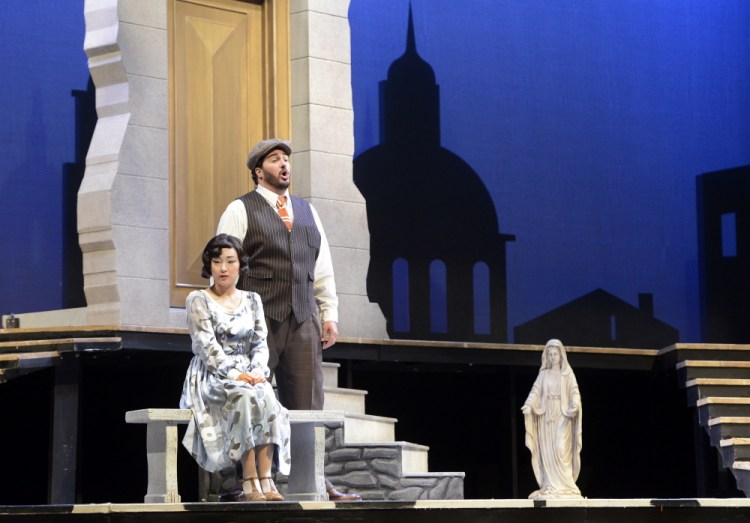The tragic clown thing was indeed getting a bit old. PORTopera’s new production of Giuseppe Verdi’s “Rigoletto,” which opened Wednesday night at Merrill Auditorium in Portland, raises the title character from court jester to henchman of a 1920s-era criminal family, making the tragedy more believable.
Artistic Director Dona D. Vaughn made the concept work flawlessly, with the aid of fine period costumes, a novel set and a cast that had few weak points. A Metropolitan Opera-level orchestra, under the baton of Stephen Lord, didn’t hurt, since Verdi’s music is the only hero of the piece.
The role of Gilda, Rigoletto’s cherished daughter, was a triumph for young soprano Hae Ji Chang, who sang the virtuoso score perfectly and with just enough power in reserve to make her character’s innocence and foolish adulation plausible. Her nurse Giovanna, aiding and abetting Gilda’s romance with the Duke, was well played by Sara Sturdivant.
Baritone Weston Hurt played Rigoletto like the complex character he is, a mixture of vicious foolery, resentful boot-licking, paternal love and superstition. It is his faith in the power of a curse that drives the action, and in his attempts to control Gilda, there is a hint of something more sinister than fatherly love.
The author of the curse, Monterone, is a nobleman about to be imprisoned by the Duke for standing in the way of one his love affairs. As portrayed by bass Dominique Rosoff, he is the only noble character in the opera.
Tenor Anthony Kalil is well cast as the Duke of Mantua, confident of his invulnerability and playing a rigged game of love as a trivial amusement. His rendition of the famous aria, “La donna è mobile,” was so well done that it reminded me of one of those recordings of operatic highlights. It occurs again, in darker circumstances, as a far-away contrast with the horrors occurring on stage.
If I have any reservations about the production, it would be with the characterizations of the assassin Sparafucile, sung by Soloman Howard, bass, and his sister Maddalena, sung by mezzo-soprano Christin-Marie Hill.
Sparafucile is often cast as a different kind of dangerous fool, comparable to Rigoletto. Howard plays him as the ultimate in cool, which is a fine concept, were it not for the fact that hanging around on street corners and offering to kill people for money is definitely uncool.
Hill, as Maddalena, the lure to attract her brother’s victims, acted the part well, but her character’s voice could have used a little more Ethel-Merman-style brazenness. She held her own in the famous quartet with the Duke, Gilda and Rigoletto, “Un di, se ben rammentomi,” but more contrast between the soprano voices would have been ideal.
A near-capacity audience gave the production a well-deserved standing ovation and multiple bows before the curtain fell. If there are tickets still available for Friday’s performance, it would be well worth hearing.
Christopher Hyde’s Classical Beat column appears in the Maine Sunday Telegram. He can be reached at classbeat@netscape.net.
Send questions/comments to the editors.



